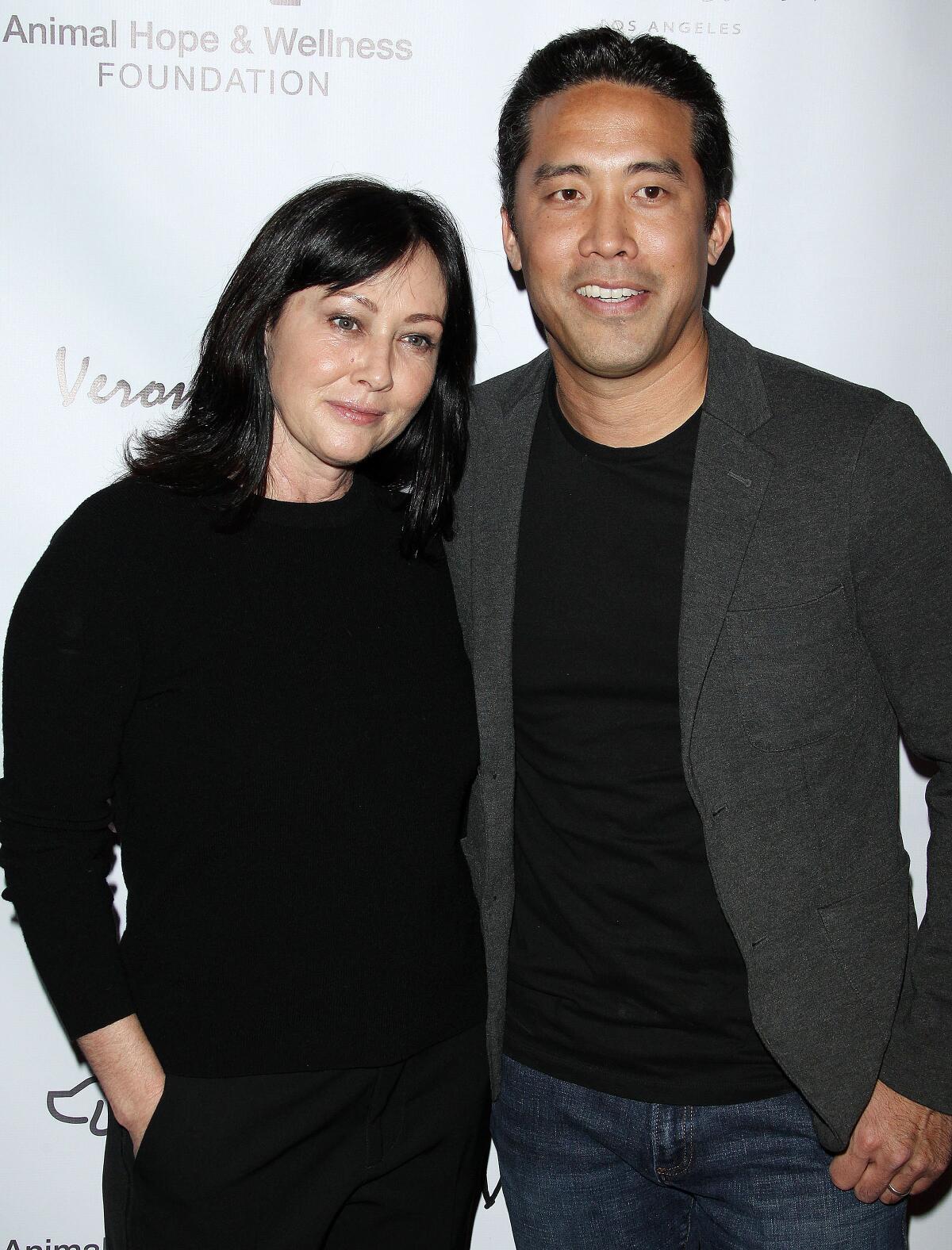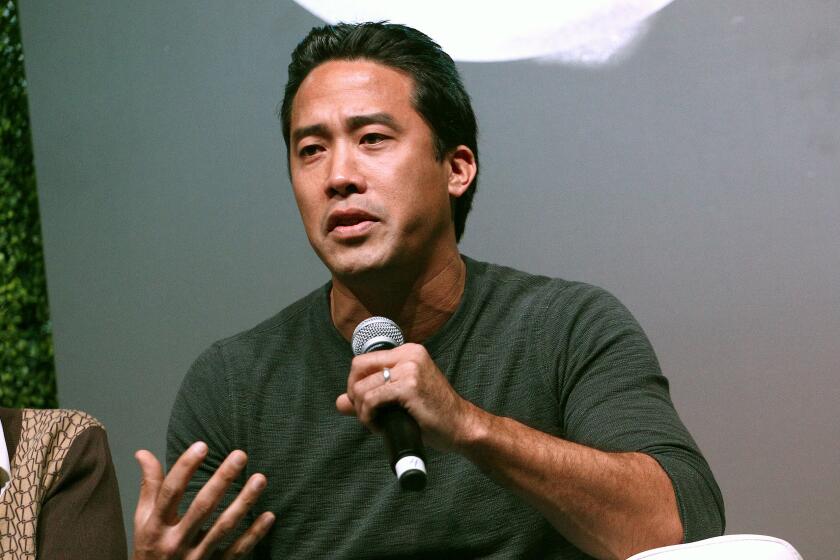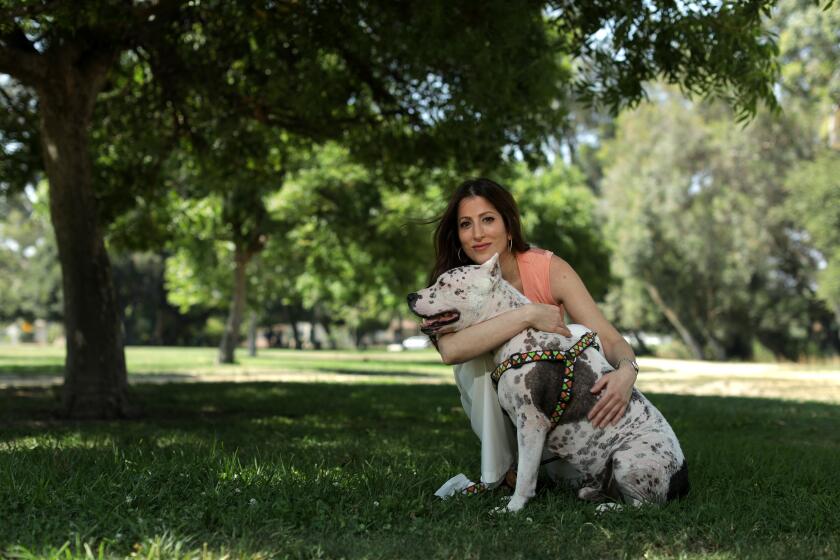New charges accuse L.A. animal activist Marc Ching of making false claims over his pet food

Hollywood-backed animal rescuer Marc Ching faces new criminal charges alleging that he falsely advertised and misbranded products he sold at his pet food store, marking the latest fallout from a Times investigation that exposed troubling practices at his business and charity.
Los Angeles prosecutors added four misdemeanor charges against Ching after an investigation by the California Department of Public Health found, among other things, that his pet food was processed and held under unsanitary conditions, said Rob Wilcox, a spokesman for the city attorney’s office.
Activist Marc Ching, whose work won support from Joaquin Phoenix, Matt Damon and other celebrities, denies paying butchers in Asia to harm dogs.
“He is alleged to have made false and misleading claims on his website, as well as on the pet food labels he used,” Wilcox said. He declined to elaborate.
Ching, 41, now faces one misdemeanor count each of practicing veterinary medicine without a license, manufacturing and packaging pet food without a license, unlawfully selling products that were falsely advertised, unlawfully selling food that was adulterated and unlawfully selling food that was misbranded, and two counts of false advertising.
If convicted of the seven charges, Ching faces up to six and a half years in jail and $13,500 in fines, Wilcox said. At a brief court hearing Wednesday, his arraignment was postponed to March, according to the courtroom clerk. Ching’s attorney declined to comment on the charges.
It’s not the first time Ching has been accused of misleading his customers. In April, the Federal Trade Commission accused him of making false or deceptive claims that an herbal supplement he was selling could treat COVID-19 and that some of his other products could treat cancer. Ching denied wrongdoing. In July, he agreed to a settlement in which he is barred from making baseless claims that his products can treat COVID-19 or cancer.
The three misdemeanor charges follow a Times investigation that uncovered years of complaints by veterinarians.
The criminal case in Los Angeles comes after a Times investigation earlier this year uncovered years of complaints by veterinarians that Ching persuaded pet owners to ignore prescribed treatment regimens and instead give their sick dogs and cats products he sells at his shop, the Petstaurant.
More than a dozen L.A.-area veterinarians and other pet care providers told The Times that Ching’s actions threatened to harm — and in some cases did harm — pets diagnosed with conditions that included kidney disease, heart failure and cancer. Their accounts date as far back as seven years.
Five of them said they complained about Ching to the California Veterinary Medical Board, alleging he was practicing veterinary medicine without a license. Ching, who describes himself as a fourth-generation herbalist and nutritionist and operates Petstaurant stores in Sherman Oaks and the Westside, is not a veterinarian. The vets said the board at the time took no action.
The Times also exposed troubling financial practices by Ching’s animal rescue charity, the Animal Hope and Wellness Foundation, and raised questions about his rescue efforts overseas. The newspaper found evidence contradicting claims about the authenticity of some of the gruesome videos he shot of animals being tortured and killed in horrifying ways, including by blowtorch, at slaughterhouses in Asia.
A whistleblower and watchdogs raise concerns over cash withdrawals, allegedly deceptive solicitations and other financial practices at the Animal Hope & Wellness Foundation. The charity denies misleading donors or misusing money.
Butchers in Indonesia told the newspaper that Ching paid them to hang a dog and burn it to death — a method of killing more cruel than any they say they normally employ — so he could stage the scene for the camera.
Ching and his attorneys have said that he has always been truthful about his work abroad, his videos were genuine and he never misused foundation funds or harmed animals.
The California attorney general’s office opened an inquiry after The Times began its investigation of Ching. It is ongoing.
Ching launched his foundation two years after his 2010 release from prison, where he spent nine years and seven months after pleading guilty to kidnapping with great bodily harm, a crime committed as part of a drug deal gone bad, according to court records.
His remarkable transformation from ex-con to Hollywood darling in animal rescue was largely the result of his foundation’s social media campaign that featured the gruesome videos from Asia. Shortly after The Times published its initial investigation, the newspaper reached out to more than a dozen actors, musicians, comedians and other celebrities who appeared in the foundation’s PSA or participated in gala fundraisers for the charity.
Veterinarians say animal activist Marc Ching persuaded their clients to abandon a prescribed treatment regimen in favor of products he sells at his for-profit pet food store.
Of the staging allegations, one, Alyssa Milano, said in May through a publicist: “I’ve never met Marc Ching but agreed to participate in a PSA opposed to cruelty to animals. If these allegations are true, I strongly condemn his actions. It’s inexcusable to torture an animal.”
Another backer of Ching’s foundation is comedian David Spade, who contributed $10,000 to the charity in 2017, according to its federal tax returns. A representative said in a statement to The Times that while Spade “doesn’t recall the specific circumstances of the ask at the time of the donation, he of course thought this was a vetted shelter and safe-haven for animals that he was supporting.”
“He had absolutely no personal connection to or prior knowledge of this organization.”
More to Read
Sign up for Essential California
The most important California stories and recommendations in your inbox every morning.
You may occasionally receive promotional content from the Los Angeles Times.














